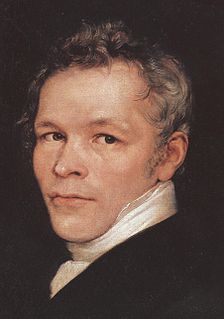A Quote by Immanuel Kant
Man relates to material things through direct insight rather than reason.
Related Quotes
The opposition of instinct and reason is mainly illusory. Instinct, intuition, or insight is what first leads to the beliefs which subsequent reason confirms or confutes; but the confirmation, where it is possible, consists, in the last analysis, of agreement with other beliefs no less instinctive. Reason is a harmonizing, controlling force rather than a creative one. Even in the most purely logical realms, it is insight that first arrives at what is new.
Enlightenment is construed as seeing things as they really are rather than as they appear; it is a direct insight into, and discernment of, the nature of reality that is apprehended only by wisdom, which transcends and is prior to the activity of discriminative thought. In this view, delusion is defined as all that is opposed to enlightenment.
There's that great Irish joke: a man is lost in the countryside, stops a passer-by: 'how do I get to Dublin?'. The passer-by says 'well, I wouldn't start from here'. Rather than starting by talking in the abstract about materialism, dualism, 'material stuff' and things like that in regard to the mind, I would rather start from somewhere else.
The heart is commonly reached, not through the reason, but through the imagination, by means of direct impressions, by the testimony of facts and events, by history, by description. Persons influence us, voices melt us, looks subdue us, deeds inflame us. Many a man will live and die upon a dogma; no man will be a martyr for a conclusion.
The meditator develops new depths of insight through direct communication with the reality of the phenomenal world... He or she is able to see not only the absence of complexity, the absence of duality, but the stoneness of stone and the waterness of water. One sees things precisely as they are, not merely in the physical sense, but with awareness of their spiritual significance.
The fifth doorway to experiencing Love for No Reason is the Doorway of Communication, which corresponds to the energy center located in the throat area. This doorway relates to speaking and listening with compassion, rather than judgment. There are some wonderful tools and techniques available to help us speak and listen with compassion that I've included in this chapter.
I'm a historian by training and by conviction. And so the thing that has throughout informed my thinking about international relations is history. I think, for example, the reason that I was perhaps able to see sooner than some others that the Soviet Empire in Eastern Europe was decaying--if not disintegrating--was that I came to it through history and through Germany, rather than through Sovietology and through Moscow. And therefore the starting point was that no empire in history has lasted forever, and this one won't either.
I think that once you're able to sort of get in line with who and how you relate to the world, you'll become closer to this index that I'm referring to. Because what you want is this card that relates to that book. What you want is this human that relates to this world, rather than having this art school society scattering that point of view somewhere in between. It becomes diffused. And that level of clarity, I think, was gained at the Studio Museum in Harlem.
The root of almost every schism and heresy from which the Christian Church has suffered, has been because of the effort of men to earn, rather than receive their salvation; and the reason preaching is so commonly ineffective is, that it often calls on people to work for God rather than letting God work through them.








































